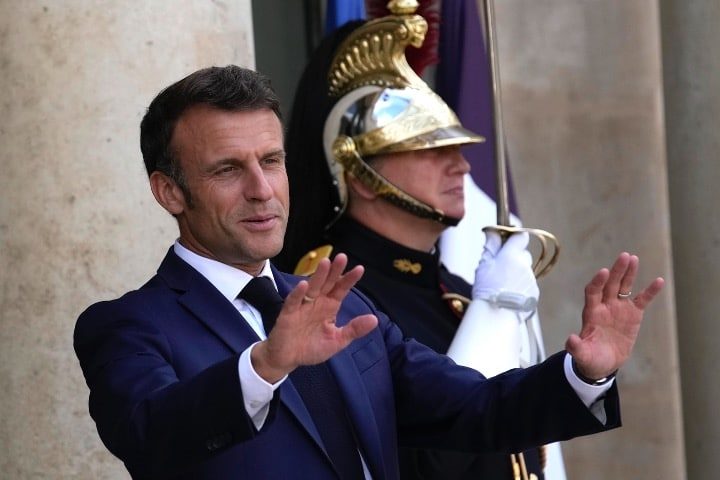
French President Emmanuel Macron has allegedly urged South African President Cyril Ramaphosa to invite him to the upcoming BRICS summit in Pretoria, scheduled to take place in August.
Apparently motivated by a desire to rival the U.S. globally and tackle Russia’s growing influence in the region, Macron was reported to have broached the prospect of his attending the summit during a phone call earlier this month with the South African leader, based on a Paris-based L’Opinion report.
“Presence at the summit was indeed mentioned in the conversation between the two politicians, but Pretoria did not indicate in any way whether it wanted to invite other international leaders to the meeting,” the French paper reported, quoting a “well-informed” source from the Élysée Palace.
France, a Group of Seven (G-7) member, is not part of the BRICS (Brazil, Russia, India, China, and South Africa). Given that no G-7 leaders have ever participated in the BRICS summit, some BRICS members have called Macron’s underlying motivations into question.
Following the public revelation of the request, Russian Foreign Ministry spokeswoman Maria Zakharova urged Paris to explain its reasons: “It would be nice if they told us why they want to attend. Do they want to once again make some contact to show Paris’ activity or is it a ‘Trojan horse’ of some sort? So let them explain,” Zakharova commented.
The French leader’s supposed request to participate in the BRICS 15th yearly summit came amid recent incendiary statements he had made that riled the United States and its allies. For example, after a three-day state visit to Beijing in April with EU Commission chief Ursula von der Leyen, Macron earned brickbats from the Western world when he urged for a European “third way,” asking Europe to refrain from getting dragged into a Sino-U.S. conflict over Taiwan and contending that Europe ought to decrease its reliance on the greenback. Although Macron’s statements incensed Washington and its allies, BRICS leaders welcomed his comments amid their longstanding plans to set up a multipolar world to counter American dominance.
However, during last month’s G-7 gathering, Macron signed on to a joint statement with other G-7 leaders that listed China as “the greatest challenge to global security and prosperity in our time.”
Notwithstanding Macron’s signature on the G-7’s anti-Chinese joint statement, though, the Chinese propaganda news outlet Global Times praised the notion of Macron participating in the BRICS summit as “bold and innovative.”
Moreover, the Communist-controlled China Daily newspaper published an article urging for Macron to be included among the summit’s participants, with the author of the article contending that “Macron is by no means a proxy of Washington, and he should be welcomed to the gathering.” Observers have contended that these two articles published in newspapers backed by the Chinese Communist Party (CCP) could be an indicator of Beijing’s desire to lead France away from America’s sphere of influence.
As of the time of writing, 19 countries, including Saudi Arabia, Iran, and Argentina, have voiced their interest in joining BRICS. BRICS member states in 2020 surpassed the U.S.-dominated G-7 bloc in terms of gross domestic product (GDP) according to purchasing power parity (PPP), with the BRICS countries’ contribution amounting to about 31.5 percent of global GDP, compared to 30.7 percent by the G-7 countries.
This month, Macron also proposed at a meeting of tech entrepreneurs in Paris that new AI technological platforms could be leveraged to deal with newly arrived immigrants.
At the yearly VivaTech tech show, he suggested the “robotisation” of French border policy while lamenting how slow the French bureaucracy was in welcoming innovation:
What is the main problem we have with immigration? It’s very little a problem of principles, it’s a problem of data processing capacities. We have a lot of people arriving, we have rules that are old and we treat them like at the beginning of the 20th century.
Macron earmarked about 500 million euros ($543 million) in new funding to “create champions” in AI and lauded projects targeting French speakers, amid rising worries about Silicon Valley companies ensuring an English-language domination of AI systems.
However, Macron’s technological vision may clash with that of the European Union (EU), following the passing of Brussels’ AI Act to deal with the ethics of AI technology. This act particularly prevents the discriminatory use of AI for migration control. Additionally, the act would impede the efforts of French intelligence services to hunt down terrorists, owing to prohibitions of real-time biometric tracking on the basis of civil liberties.
For years, France has been grappling with the problem of illegal migration, amid allegations that criminal gangs have corrupted and infiltrated parts of the security apparatus.
On June 5, investigators from the Sub-Directorate for Combating Irregular Migration (SDLII) raided numerous residences and venues, arresting and charging eight individuals, including two police officers, believed to have been privy to a complex forgery scheme that aided hundreds of illegal migrants in obtaining official French residence permits.
Currently, the French president has to deal with dismal polling numbers amid a drawn-out conflict over pension reforms and an increase in support for right-leaning rival Marine Le Pen.



